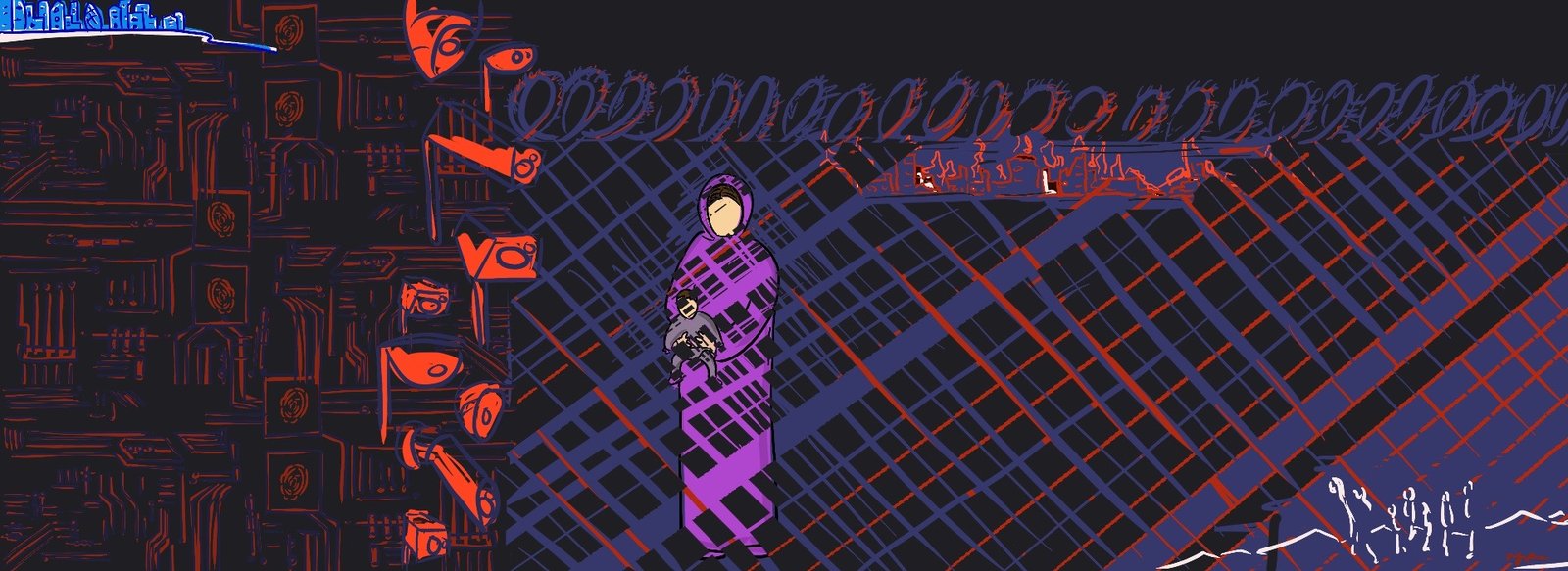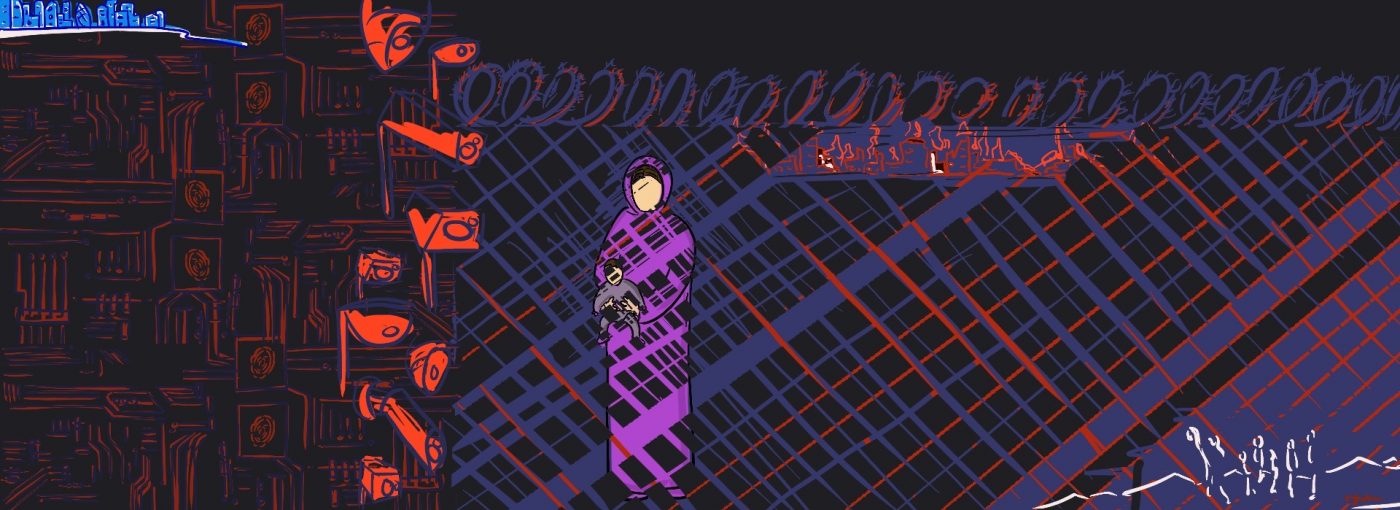Borders – physical, intangible and imagined – are at the heart of the workings of many modern states. Migration as a ‘threat’ is increasingly presented as dogma by nations in the Global North across the world. Human rights abuses at borders in regions and states such as the US, Europe and Australia receive growing media attention but see little change. The rights implications of the UK’s hostile environment policies are well-documented, as are human rights abuses at Australia’s offshore detention centres. Trump’s violent border policies received global media coverage, yet were a continuation of increasingly brutal US border enforcement that the Obama administration helped to build, and which President Biden continues. Less visible on the global media stage is the insidious network of corporations that profit from the human rights infringements and suffering that are inseparable from the worldwide hardening of borders. These companies, whose products and services enable the functioning and violence of borders – both literal and non-physical – are increasingly being categorised as ‘the Border Industry’.

To get some idea of the creeping scope of the Border Industry, we could look at any number of companies implicated in an array of border control services. Although difficult to define, areas the Border Industry broadly encompasses are force, mass surveillance and technology, ‘services’, detention and consultancy. The arms industry is one of the sectors most implicated in the Border Industry, especially as the service they provide is the most visible and tangible contribution to border violence: force. Arms companies provide weapons systems and military-grade technologies to state border forces across the world. French company Thales, for example, provides radar and maritime surveillance systems to states and EU border agency Frontex, whose operations have come under scrutiny for their complicity in human rights abuses. Thales also provides fingerprint identification technology to Eurodac (the EU’s asylum fingerprint database).
Arms manufacturer Lockheed Martin is just one of many other corporations that provides its border security products to states across the globe. Lockheed Martin’s radar systems, surveillance planes and drones form a significant part of border reinforcement in both Australia and the US, as well as multiple EU states. Between 2005 and 2019, the company secured 20 contracts with the US Customs and Border Protection agency (CBP) worth a total of $1 billion. Meanwhile, UK-based BAE systems, elsewhere accused of complicity in war crimes in Yemen, secured £24,879,180 worth of Home Office contracts in 2020. These are listed as “Digital Data and Technology” and “Border Force” in the Home Office’s public records. The arms company’s biometrics technologies allow the Home Office to reinforce the hostile environment through connecting police and immigration enforcement databases. As a result, 21 police forces in England and Wales already have mobile fingerprint scanners that allow instant identification that can be shared with immigration services.
Arms companies are therefore the biggest winners here, making money from human suffering at every turn. They profit firstly from selling the weapons that create the violent conditions people are forced to flee from. They then actively feed alarmist and racialised narratives that conflate terrorism with people seeking asylum, allowing them to sell their technology to states who are looking for justification to impose increasingly hostile and harsh borders, in turn to pander to an increasingly nationalised voter base. Lockheed Martin blends the corporate language of “partnerships” with militaristic, xenophobic concepts of “securing a nation’s borders” and helping it “defend against outside threats”. More explicitly than Lockheed Martin, Thales have publicly stated while advertising their technologies that “borders first, then urban centres” are “the objectives of both terrorists and refugees”. The rhetoric of multinational arms companies matches closely with the increasingly violent xenophobia of those countries within which they operate, including the wave of xenophobia sweeping across Europe.
That arms companies are also involved in providing technological tools for the mass surveillance of migrants shows just how interconnected the different aspects of the Border Industry are. Increasingly, a significant part of border enforcement and violence happens away from physical borders themselves. Biometrics and mass surveillance technologies are an increasingly significant pillar of the Border Industry, underpinning state borders in a less visible, but no less violent way. Such technologies enable states and governmental bodies to identify and track migrants, enforcing borders both internally and externally. Frontex, for example, has sought to use apps and biometrics to manage asylum seekers before they even reach Europe. It comes as no surprise then that these technologies overwhelmingly discriminate against racialised communities, and that there is little regulation or accountability around this “techno-solutionism”.
Familiar brands like HP and Microsoft are also complicit players in this game. HP Belgium’s five consecutive annual contracts from 2012 to maintain the Biometric Matching System for the snappily named European Union Agency for the Operational Management of Large-Scale IT Systems in the Area of Freedom, Security and Justice (eu-LISA). But it’s lesser known firms such as Palentir and Accenture, one of HP’s partners in these contracts, that are stealthily gaining significant sway in the international web of border technology firms. Accenture has been a part of maintaining the EU’s ‘smart walls’ – its technological borders – since a €157 million eu-LISA contract in 2006, and is involved in state-level work such as the creation of a new digital immigration service in Finland. Not confining themselves to just one area of border enforcement, Accenture also signed a $297 million contract with the CBP in 2017 to help hire border patrol agents. This contract was ultimately terminated after Accenture employees themselves petitioned the company to end it, refusing to stand for “technology supercharging inhumane and cruel policies”.
If technology is a broad and unfixed area of the Border Industry, the category of ‘services’ is even harder to identify and define in scope. There are tiers of complicity and involvement in the tight networks between private service companies and states enforcing violent borders. Some service providers, such as deportation flight operators, actively and knowingly participate in human rights infringements. Operators of non-deportation transport within a country (such as between detention centres) could be classed as complicit but external to core border services. The same is true for other types of service. A corporation that manages a detention centre is undeniably a key agent in the policing of borders that restrict migrants’ movement and rights. A cleaning service at the same centre, on the other hand, might be considered a more passive participant in state violence. This makes the area of border-related services a complex one to define and categorise, and adds layers to the question of how best to combat the entangled web that is the Border Industry.
Some border enforcement service providers are household names, and deportation flights have been subject to extensive media attention in recent years. The operators of the flights in the UK include airlines such as TUI, British Airways and Easyjet, with well-known airlines across the globe participating in this profitable industry. In Australia, Qantas has come under repeated pressure from shareholders to end its complicity in the forced removal of asylum seekers, aptly noting that the airline is not obliged to participate in this process. And it isn’t just the flights themselves that provide private corporations with an opportunity for financial gain. In the UK, the Home Office outsources the booking and administration of deportation flights to US travel management firm Carlson Wagonlit Travel, who in 2019 secured a fruitful contract worth almost £16 million.
Detention is one of the ways in which borders are most violently enforced within states. Aside from detention in itself being a violent act, the outsourcing of the management of detention centers fosters a lack of accountability and paves the way for violence and abuse. It also goes hand in hand with the increasing global trend of privatisation in the prison sector, and nowhere is this overlap more evident than in private security firm G4S. In 2019, G4S gained an estimated £7,758 million in revenue from its involvement in border-related services worldwide, primarily detention. It has come under repeated scrutiny around the level of brutality in the detention centres it runs, most notably UK detention centre Brooks House. Employing 570,000 people worldwide, G4S’ involvement in detention extends to offshore centers in Australia, on top of its prisons in the UK, Australia and South Africa. “Services” companies Serco and Mitie have also won detention centre contracts, at Yarl’s Wood, Gatwick and Heathrow. In a demonstration of the cosy relationships border companies have with states, all three of these firms also run Covid testing sites in the UK. The overlap between Border Industry service providers with other increasingly outsourced sectors is a sinister indication of the complex entanglement of privatisation and violence.
With such a vast geographical and logistical reach, there are of course many (very profitable) strands of the Border Industry that don’t fall into neat categorisation. PricewaterhouseCoopers (PwC), for example, comes under the murky classification of “consultancy”. Between 2017 and 2019 it gained $5 million in ICE contracts, and its global contracts (which include Frontex, the European Commission and the Australian government) earned it an estimated $42.4 billion revenue in 2019. The firm’s statement that ‘the migrant crisis can generate a variety of opportunities for businesses’ succinctly summarises the ethos at the heart of the Border Industry: human suffering is an opportunity for profit, and the framing of migration as a “crisis” allows corporations to gain from a globe-spanning atmosphere of xenophobia.
The Border Industry creates the conditions for its own thriving. It is no coincidence that the increasing power and involvement of companies advocating for reinforcing borders and selling migration as a security threat, coincides with a growing trend of violent state rhetoric around hardening borders. These are companies with fingers in many pies, both geographically and in terms of the sectors and services they are involved in. The nature of the Border Industry as a complicated web is a barrier both in defining the industry, and in fighting against its power. However, there is hope to be found in the growing scrutiny of the Border Industry and labeling of its existence. As more groups and organisations begin to mobilise against this complex network of corporations that profit from suffering, we can anticipate greater awareness and action.
Below is a list of organisations campaigning against the Border Industry:
Lesbians and Gays Support the Migrants
Subscribe to shado's weekly newsletter
Exclusive event news, job and creative opportunities, first access to tickets and – just in case you missed them – our picks of the week, from inside shado and out.















